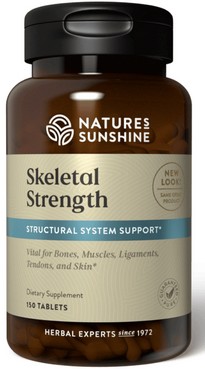

Skeletal Strength
Nutritional support for healthy bones and connective tissue
With the high incidence of bone fractures in the elderly due to osteoporosis, many people, especially women, take calcium supplements in hopes of protecting the health of their bones. What many people fail to realize is that it takes a lot of other minerals, as well as vitamins, in order to build healthy bones. Skeletal Strength is specially formulated to provide not just calcium, but all of the other key nutrients necessary to build healthy bones. It is used not only to help prevent osteoporosis and arthritis, but to help heal broken bones and aid bone development.
Suggested Use
Take 2 tablets with a meal twice daily to supply nutrition needed for bone health or to promote healing of broken bones.
Ingredients & Benefits
Calcium is the most abundant mineral in the body and in the bones. Calcium loss from the bones causes them to weaken.
Phosphorus is also needed for bone formation, since the primary form of calcium in bones and teeth is calcium phosphate.
Magnesium and calcium must be in proper balance in order for calcium to be properly utilized. Sixty percent of the magnesium in the body is found in the bones. Ideally, we need one part magnesium for every two parts calcium in our diet. Most people have far more calcium than magnesium in their diets, so skeletal strength
contains equal parts calcium and magnesium.
Zinc is necessary for the formation of the collagen tissue which forms the structure of bone. It helps broken bones heal faster and when combined with calcium improves bone uptake of calcium.
Copper and zinc enhance the effectiveness of vitamin D. Research shows that copper promotes bone mineralization and decreases bone loss. In a 2-year study, supplementing diets with copper reduced bone loss in middle-aged women by 90% compared to a placebo.
Manganese is another trace element that plays an important role in bone formation. It is a co-factor for bone-building enzymes. Supplements have been shown to increase bone mineral density in post-menopausal women and animal studies show deficiencies cause malformation of bone and cartilage.
Potassium plays an important role in maintaining bone density. It is the third most abundant mineral in the body. Potassium has an alkalizing effect on the body which helps prevent the loss of alkaline minerals like calcium and magnesium.
Boron is a trace mineral found in highest concentration in the bones. It supports the synthesis of bone-protecting hormones like estrogen, testosterone and DHEA. Animal studies show that low levels of boron result in abnormal bone development.
Vitamin A is essential to the metabolism of calcium
Vitamin D is essential to the absorption of calcium in the intestines. It helps maintain adequate levels of calcium and phosphorus in the blood for bone mineralization. A deficiency causes bone weakness and malformation.
Vitamin C is essential to the formation of collagen, the protein structure that forms the framework for bones.
Vitamin B12 may inhibit bone breakdown and low levels are common in people who suffered osteoporosis-related bone factures. It works with vitamin B6 to reduce homocysteine levels.
Vitamin B6 helps the body metabolize and excrete homocysteine. High homocysteine levels are associated with defective bone formation and menopausal women show an impaired ability to
metabolize and excrete homocysteine.
Betaine hydrochloric acid (HCL) supplements stomach acid, which is critical to the absorption of calcium and other minerals essential to bone health. It helps the body absorb the minerals in Skeletal Strength.
Papaya and Pineapple Fruit contain the protein digesting enzymes papain and bromelain. This aids digestion and assimilation of minerals and other nutrients needed for bone health. They also reduce inflammation in injuries and rheumatoid arthritis.
Horsetail is known for its silica content. Silica improves load
bearing capacity of joints and helps fix calcium in the bones. Higher
levels of silicon in the diet have been correlated with greater bone mineral density. Horsetail is also a source of calcium and potassium and has been historically used to support and nourish bones, cartilage, ligaments and tendons.
Parsley is a rich source of potassium and other electrolytes.
It aids kidney function, which helps the body maintain fluid and mineral balance.
Valerian is a widely recognized herbal sedative. It is also one of the highest herbs in calcium.
Licorice root helps reduce inflammation and aids adrenal function. The adrenals also help maintain fluid and mineral balance.
|